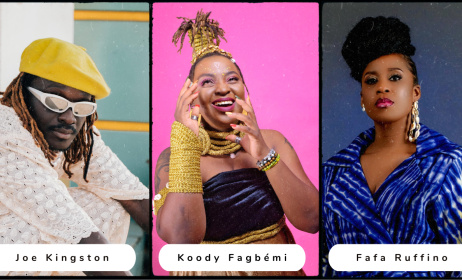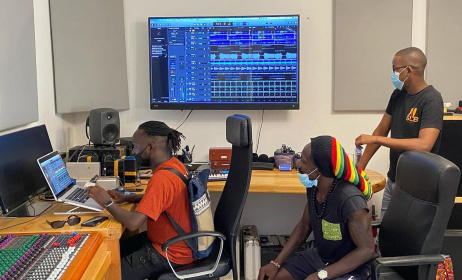Emerging Kenya: Akoth Jumadi
Rising Kenyan singer, songwriter and multi-instrumentalist Akoth Jumadi has over the past few years steadily progressed her emotive sound – a carefully measured coalescence of Luo folk and Afro-soul. Her debut EP Ere Yo came out in October – quickly establishing her as a member of a new wave of young Kenyan musicians making fresh sounds that are worth paying attention to.
 Akoth Jumadi fuses Luo folk music with Afro-soul.
Akoth Jumadi fuses Luo folk music with Afro-soul.
Jumadi is a self-taught guitarist who also plays the bass, nyatiti and ukulele. The 24 year old started her musical journey in 2015 as a member of the One Vibe band. This was a year after she began studying disaster management at Maseno University in Kisumu. After graduating in 2018, she moved to Nairobi to focus on a solo career. She has since played several concerts across the country as well as in South Sudan and Uganda.
Music In Africa spoke with Jumadi about her flourishing career.
MUSIC IN AFRICA: Like many emerging artists, your musical journey has not been easy. Did you ever feel like quitting?
AKOTH JUMADI: Yes, I had moments where I felt like giving up. Life was hard when I was doing cover songs with bands, and it got worse when I began my solo career. I would travel to different cities on my own with my guitar, broke and sleeping on friends’ couches. At that point, I didn’t understand why I was working so hard for so little.
What about now?
[Laughs]. Quitting is not an option. I am glad I never gave up because right now making and performing my music is the one thing that keeps me sane and connects me with people and other aspects of life.
What inspired you to start composing and recording your own music?
I fell in love with my voice and stories, and needed to hear myself more. I didn’t record immediately because I needed to be secure enough to express myself freely and represent my immediate environment, culture and interactions.
You describe yourself as an architect of the future. How does this description manifest in your music?
As an architect of the future, using my music, I am on the frontier of awaking and stirring people’s ideas, beliefs, creativity and emotions. We live in a society where our beliefs and ideas are very muffled to fit in with what has already been created. My songs challenge people to observe more, rediscover themselves and keep moving and living.
The Ere Yo EP seems ideological in the way it came into being.
Yes. It’s ideological because it stems from a particular story, journey and vision. The flow goes through an awakening period, and then there’s the period of awareness and finally becoming, which is absolute freedom. A lot of my music is based on personal identity and overcoming struggles – physical, mental or societal.
Which kind of conversations have come up since the EP’s launch?
The conversations have been about the need for people to be spiritual and embrace their traditional language to merge new music with the old, especially now that pop music does not have much depth. If we make music with an identity, young people will be interested in their roots, and I feel like that would be groundbreaking.
Women in the entertainment and music industry have always faced sexism and the frustration that comes with it. Can you give your views about this topic?
I see sexism in the entertainment industry the same way that I see it throughout life. And it’s not this way because there are more talented male artists. It’s just that sexism is rampant. My advice to upcoming women artists is to keep creating. When we take up space and support other women in the music industry, we carve ourselves a space to flourish and undermine sexist practices in the music business.
If you could give players in the industry advice about how they could better support women, what would it be?
Create more forums for women to explore what they can musically, like play different instruments and produce music. I think that would go a long way in levelling the playing field where men and women compete for the same opportunities.
When is your full-length album coming out and what should people expect from it?
It will be out next year. People should expect a lot of sounds from the North, Coast and Western regions of Kenya. There is also a lot of soul and maturity in the delivery.
If you could start over, what would you do differently?
I would not be gullible. I was too open to what people said or thought about my music, and sometimes just blindly believed in what they thought was best. So if I were to get a do-over, I would speak for myself more and trust my instincts.
What do you need to take your career to the next level?
I need to sign with a good record label to utilise all the opportunities that come with it. But until that happens, I need people to listen and share my work to be heard worldwide. I would also love to collaborate with different artists on music that’s relevant in these times.



























Commentaires
s'identifier or register to post comments